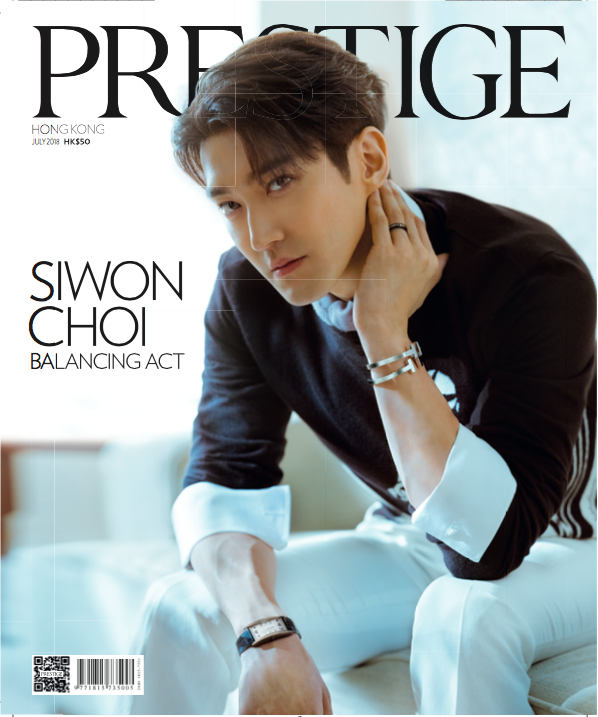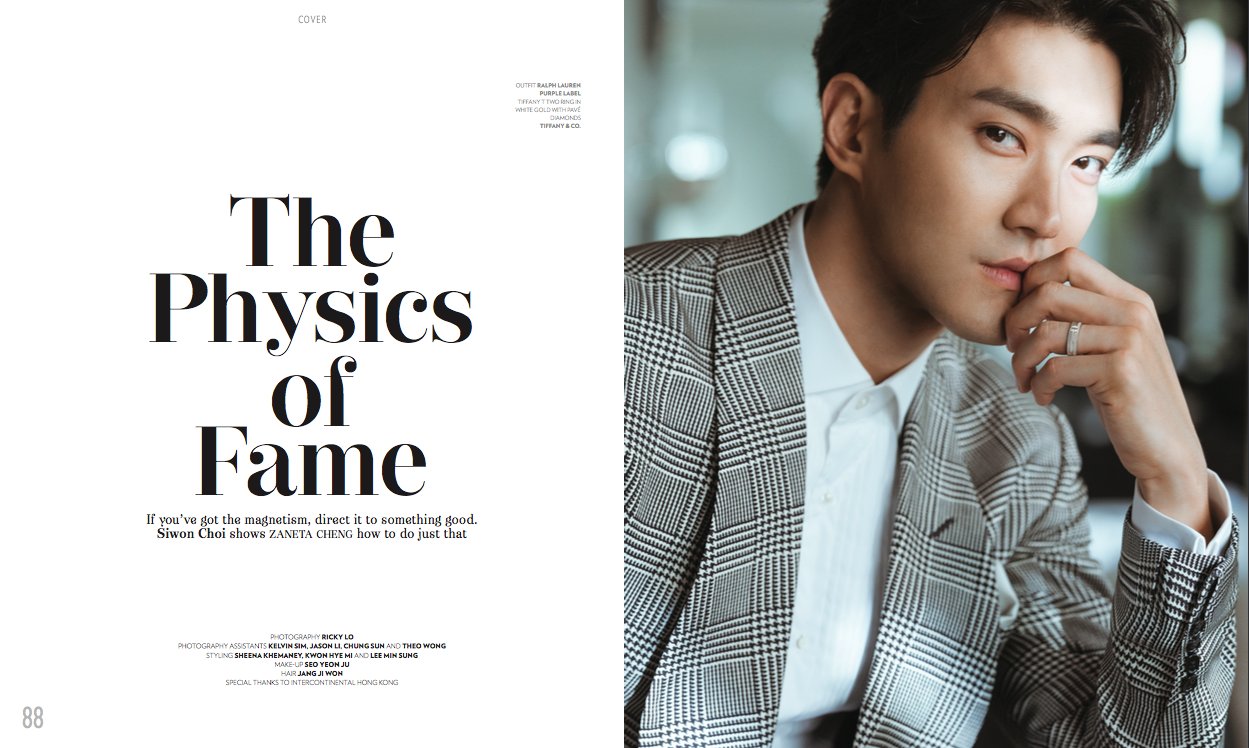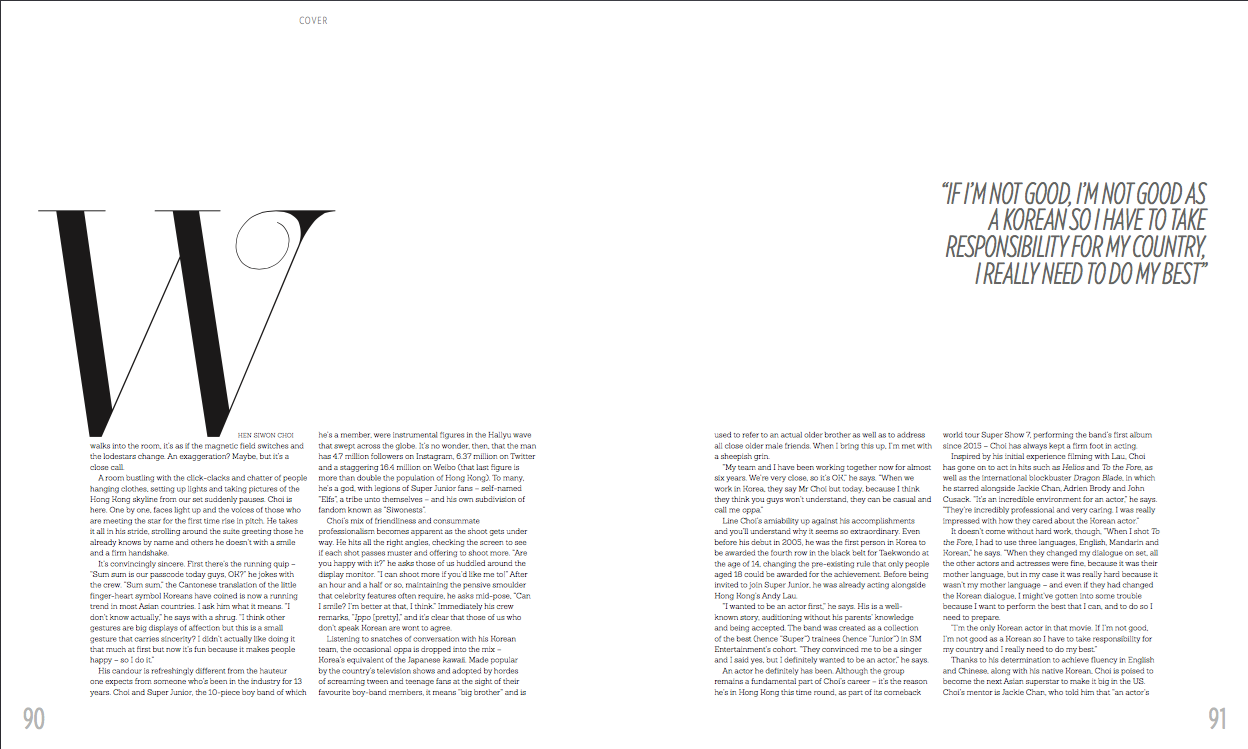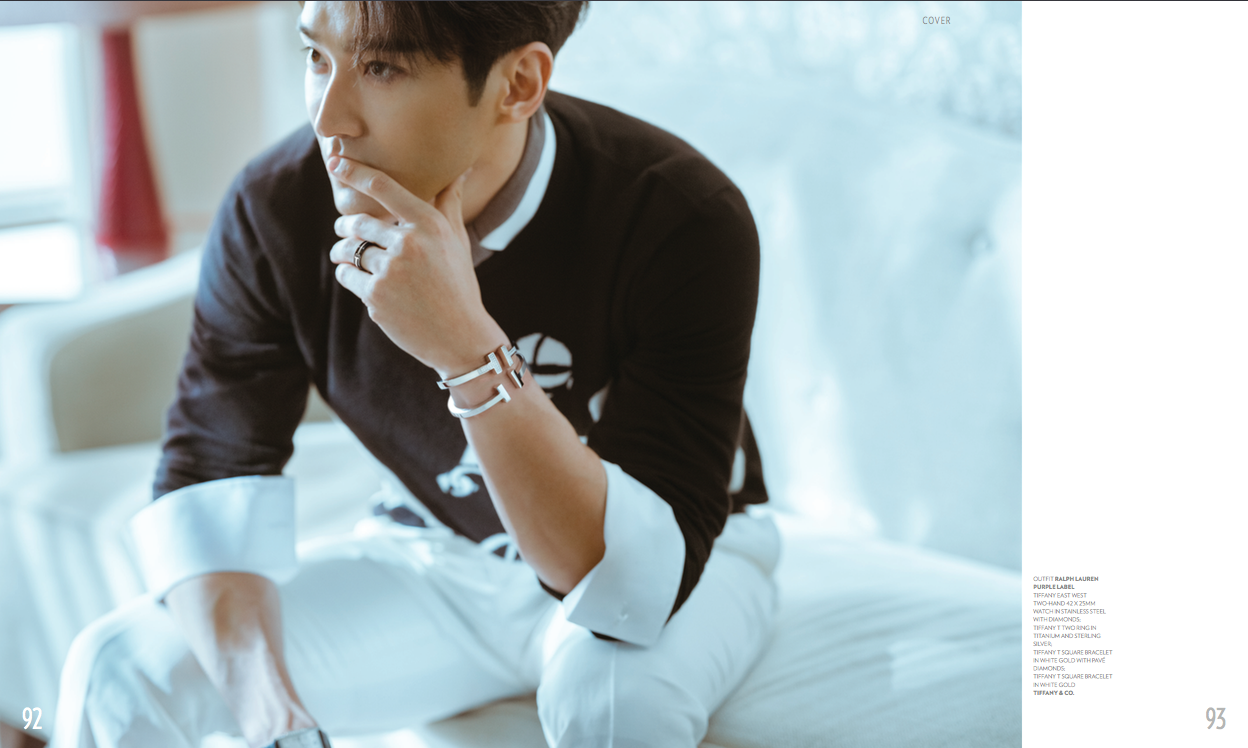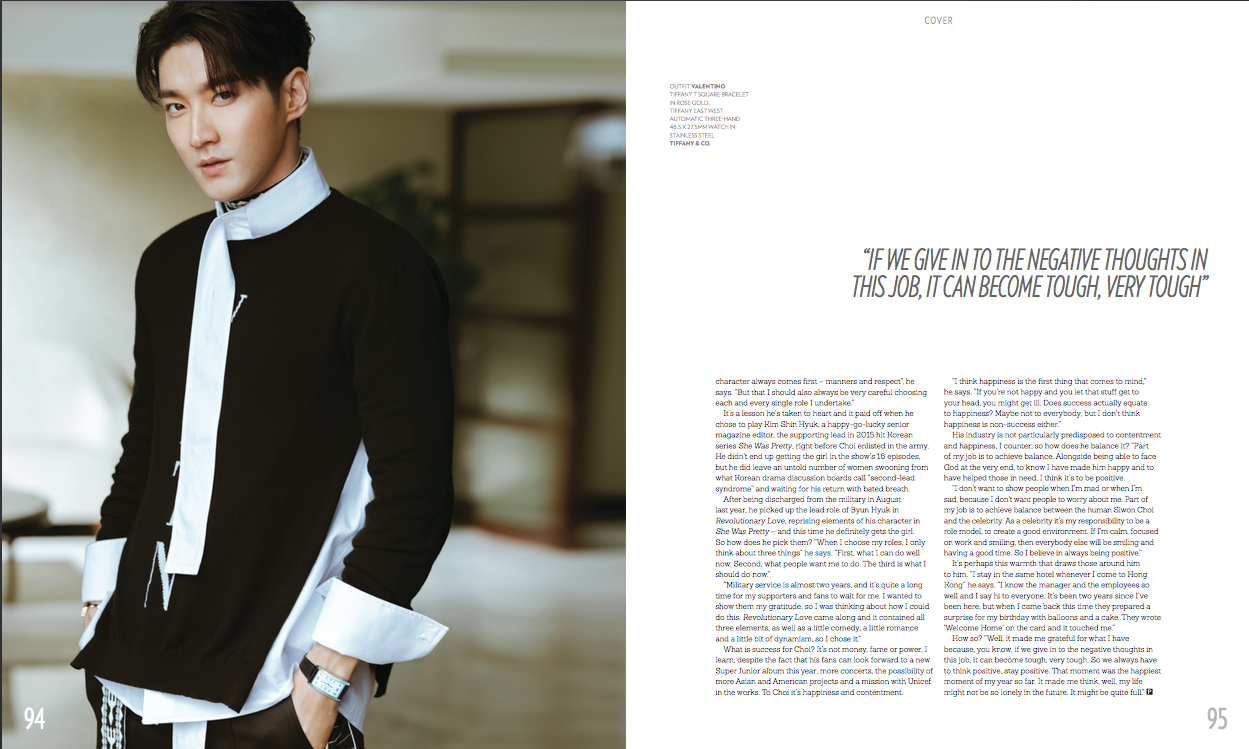Siwon Choi (Cover Story) | Prestige Hong Kong (July 18)
If you’ve got the magnetism, direct it to something good. Siwon Choi shows Zaneta Cheng how to do just that
When Siwon Choi walks into the room, it’s as if the magnetic field switches and the lodestars change. An exaggeration? Maybe, but it’s a close call.
A room bustling with the click-clacks and chatter of people hanging clothes, setting up lights and taking pictures of the Hong Kong skyline from our set suddenly pauses. Choi is here. One by one, faces light up and the voices of those who are meeting the star for the first time rise in pitch. He takes it all in his stride, strolling around the suite greeting those he already knows by name and others he doesn’t with a smile and a firm handshake.
It’s convincingly sincere. First there’s the running quip – “Sum sum is our passcode today guys, OK?” he jokes with the crew. “Sum sum,” the Cantonese translation of the little finger-heart symbol Koreans have coined is now a running trend in most Asian countries. I ask him what it means. “I don’t know actually,” he says with a shrug. “I think other gestures are big displays of affection but this is a small gesture that carries sincerity? I didn’t actually like doing it that much at first but now it’s fun because it makes people happy – so I do it.”
His candour is refreshingly different from the hauteur one expects from someone who’s been in the industry for 13 years. Choi and Super Junior, the 10-piece boy band of which he’s a member, were instrumental figures in the Hallyu wave that swept across the globe. It’s no wonder, then, that the man has 4.7 million followers on Instagram, 6.37 million on Twitter and a staggering 16.4 million on Weibo (that last figure is more than double the population of Hong Kong). To many, he’s a god, with legions of Super Junior fans – self-named “Elfs”, a tribe unto themselves – and his own subdivision of fandom known as “Siwonests”.
Choi’s mix of friendliness and consummate professionalism becomes apparent as the shoot gets under way. He hits all the right angles, checking the screen to see if each shot passes muster and offering to shoot more. “Are you happy with it?” he asks those of us huddled around the display monitor. “I can shoot more if you’d like me to!” After an hour and a half or so, maintaining the pensive smoulder that celebrity features often require, he asks mid-pose, “Can I smile? I’m better at that, I think.” Immediately his crew remarks, “Ippo [pretty],” and it’s clear that those of us who don’t speak Korean are wont to agree.
Listening to snatches of conversation with his Korean team, the occasional oppa is dropped into the mix – Korea’s equivalent of the Japanese kawaii. Made popular by the country’s television shows and adopted by hordes of screaming tween and teenage fans at the sight of their favourite boy-band members, it means “big brother” and is used to refer to an actual older brother as well as to address all close older male friends. When I bring this up, I’m met with a sheepish grin.
“My team and I have been working together now for almost six years. We’re very close, so it’s OK,” he says. “When we work in Korea, they say Mr Choi but today, because I think they think you guys won’t understand, they can be casual and call me oppa.”
Line Choi’s amiability up against his accomplishments and you’ll understand why it seems so extraordinary. Even before his debut in 2005, he was the first person in Korea to be awarded the fourth row in the black belt for Taekwondo at the age of 14, changing the pre-existing rule that only people aged 18 could be awarded for the achievement. Before being invited to join Super Junior, he was already acting alongside Hong Kong’s Andy Lau.
“I wanted to be an actor first,” he says. His is a well-known story, auditioning without his parents’ knowledge and being accepted. The band was created as a collection of the best (hence “Super”) trainees (hence “Junior”) in SM Entertainment’s cohort. “They convinced me to be a singer and I said yes, but I definitely wanted to be an actor,” he says.
An actor he definitely has been. Although the group remains a fundamental part of Choi’s career – it’s the reason he’s in Hong Kong this time round, as part of its comeback world tour Super Show 7, performing the band’s first album since 2015 – Choi has always kept a firm foot in acting.
Inspired by his initial experience filming with Lau, Choi has gone on to act in hits such as Helios and To the Fore, as well as the international blockbuster Dragon Blade, in which he starred alongside Jackie Chan, Adrien Brody and John Cusack. “It’s an incredible environment for an actor,” he says. “They’re incredibly professional and very caring. I was really impressed with how they cared about the Korean actor.”
It doesn’t come without hard work, though, “When I shot To the Fore, I had to use three languages, English, Mandarin and Korean,” he says. “When they changed my dialogue on set, all the other actors and actresses were fine, because it was their mother language, but in my case it was really hard because it wasn’t my mother language – and even if they had changed the Korean dialogue, I might’ve gotten into some trouble because I want to perform the best that I can, and to do so I need to prepare.
“I’m the only Korean actor in that movie. If I’m not good, I’m not good as a Korean so I have to take responsibility for my country and I really need to do my best.”
Thanks to his determination to achieve fluency in English and Chinese, along with his native Korean, Choi is poised to become the next Asian superstar to make it big in the US. Choi’s mentor is Jackie Chan, who told him that “an actor’s character always comes first – manners and respect”, he says. “But that I should also always be very careful choosing each and every single role I undertake.”
It’s a lesson he’s taken to heart and it paid off when he chose to play Kim Shin Hyuk, a happy-go-lucky senior magazine editor, the supporting lead in 2015 hit Korean series She Was Pretty, right before Choi enlisted in the army. He didn’t end up getting the girl in the show’s 16 episodes, but he did leave an untold number of women swooning from what Korean drama discussion boards call “second-lead syndrome” and waiting for his return with bated breath.
After being discharged from the military in August last year, he picked up the lead role of Byun Hyuk in Revolutionary Love, reprising elements of his character in She Was Pretty – and this time he definitely gets the girl. So how does he pick them? “When I choose my roles, I only think about three things” he says. “First, what I can do well now. Second, what people want me to do. The third is what I should do now.”
“Military service is almost two years, and it’s quite a long time for my supporters and fans to wait for me. I wanted to show them my gratitude, so I was thinking about how I could do this. Revolutionary Love came along and it contained all three elements, as well as a little comedy, a little romance and a little bit of dynamism, so I chose it.”
What is success for Choi? It’s not money, fame or power, I learn, despite the fact that his fans can look forward to a new Super Junior album this year, more concerts, the possibility of more Asian and American projects and a mission with Unicef in the works. To Choi it’s happiness and contentment.
“I think happiness is the first thing that comes to mind,” he says. “If you’re not happy and you let that stuff get to your head, you might get ill. Does success actually equate to happiness? Maybe not to everybody, but I don’t think happiness is non-success either.”
His industry is not particularly predisposed to contentment and happiness, I counter, so how does he balance it? “Part of my job is to achieve balance. Alongside being able to face God at the very end, to know I have made him happy and to have helped those in need, I think it’s to be positive.
“I don’t want to show people when I’m mad or when I’m sad, because I don’t want people to worry about me. Part of my job is to achieve balance between the human Siwon Choi and the celebrity. As a celebrity it’s my responsibility to be a role model, to create a good environment. If I’m calm, focused on work and smiling, then everybody else will be smiling and having a good time. So I believe in always being positive.”
It’s perhaps this warmth that draws those around him to him. “I stay in the same hotel whenever I come to Hong Kong” he says. “I know the manager and the employees so well and I say hi to everyone. It’s been two years since I’ve been here, but when I came back this time they prepared a surprise for my birthday with balloons and a cake. They wrote ‘Welcome Home’ on the card and it touched me.”
How so? “Well, it made me grateful for what I have because, you know, if we give in to the negative thoughts in this job, it can become tough, very tough. So we always have to think positive, stay positive. That moment was the happiest moment of my year so far. It made me think, well, my life might not be so lonely in the future. It might be quite full.”
